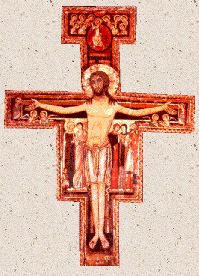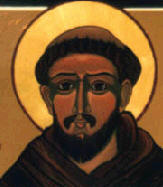...of Assisi, founder of the Franciscan Order of priests and brothers, is honored as our patron saint, as well as the patron saint of animals, ecology, and universal good! Francis was born in Assisi, in the Umbria region of Italy, in 1181 or 1182. (The exact date is not known.) His father was a prosperous clothing merchant, therefore Francis was able to receive some early elementary education, but he was not very studious, so his literary education remained incomplete. He planned to follow his father into the clothing trade, but he also had dreams of being a troubadour or a knight.
In 1201, after a very “indulgent” and even whimsical youth, Francis followed that second dream and took part in an attack on the city of Perugia; but he was taken prisoner, and remained a captive there for over a year. As a result of his captivity, and after surviving a very severe illness, his mind turned to religion, as he began to see the emptiness of the life that he had been leading. But still, around 1205, he enlisted in another military expedition, this time to Apulia. Skirmishes between neighboring towns were quite common at the time.
However, during the course of that campaign, Francis had a dream in which a voice bade him to return to Assisi. He did so at once. Still, not sure of the meaning of the dream, he returned also to his old friends; but his changed demeanor plainly showed that his heart was no longer with them. At that point, he almost instantly turned to a lifestyle of prayer and solitude and began to care for the sick. One day during this time, Francis drew unexpectedly near to a leper. Normally, he would have been repulsed by the sight, but something controlled his natural aversion this time, and he approached the leper, embraced him, and gave him all the money he had.
In the next year, 1206, Francis had a vision in which a crucifix at San Damiano  was calling to him to “repair His Church which had fallen into ruin.” Francis interpreted this as a command to repair the church at San Damiano, which was near Assisi, and devoted himself to re-building the church that had been in disrepair for some time. Francis began to beg for his food, and lived as a hermit in a nearby cave.
was calling to him to “repair His Church which had fallen into ruin.” Francis interpreted this as a command to repair the church at San Damiano, which was near Assisi, and devoted himself to re-building the church that had been in disrepair for some time. Francis began to beg for his food, and lived as a hermit in a nearby cave.
His father, angry and embarrassed by Francis' behavior, imprisoned him, and then brought him before the bishop for being disobedient. As he stood before the bishop, Francis finally “understood” what God was really telling him; so he renounced all his rights to inheritance and all his possessions, including his clothes! Stripping himself, Francis handed his clothing to his father and said, “My Father is in heaven, hallowed be His name.” Francis then embraced his father, and in walking away, he “embraced” what he called “Lady Poverty,” and entered into deep prayer.
He believed that God was calling him to preach, to “rebuild the people who had fallen into ruin,” and was soon joined by companions who also wanted to reject the opulent lifestyle of the time and to help bring God’s word to the people.
When they numbered eleven, Francis established a “Rule,” and received approval from Pope Innocent III for the brotherhood, or “Order,” to be established, which Francis called the Order of Friars Minor, or “O.F.M.” Francis emphasized poverty, chastity, and obedience as the simple “Rule of the Order.”
The friars traveled throughout central Italy and beyond, preaching that people should turn from their worldly ways and turn to Christ. Relying on God's providence rather than on worldly goods, the brothers worked for their sustinance, and begged only if no work was available; and any surplus was given to the poor.
In 1212, Clara Sciffi, a girl from a noble family living in Assisi, joined Francis' movement. With his encouragement she established a religious sisterhood at San Damiano, the Poor Ladies, later known as the Poor Clares.
One of Francis' most famous sermons is one he gave to a flock of birds! One day while Francis and some friars were traveling along the road, Francis looked up and saw the trees full of birds. Francis left his companions in the road and eagerly approached the birds, humbly begging them to "listen to the word of God." One of the friars recorded the sermon, which overflows with Francis's love of God’s creation:
"My brother and sister birds, you should praise your Creator very much and always love him; for he gave you feathers as clothing, wings so that you can fly, and whatever else is necessary. God made you noble among his creatures, and he gave you a home in the purity of the air. Though you neither sow nor reap, he nevertheless protects and governs you without any solicitude on your part." Biographer Thomas of Celano records that the birds stretched their necks and extended their wings as Francis walked among them touching and blessing them. This event was a turning point for Francis. Preaching became easier for him as he was filled with the Holy Spirit in a profound way!
In 1218, Francis devoted his entire time to missionary journeys throughout Italy. He usually preached out-of-doors, in the marketplaces, from the church steps, and in castle courtyards. The crowds engaged the “ease of his words,” and followed him from town to town; and even the clergy, who usually frowned on such things, greeted him with church bells ringing! The sick were being healed, and there was great enthusiasm for his words of new life in Christ. His talks were short, uplifting, and affectionate; and touched even the hardest of hearts.
In time, as the brotherhood became more organized; and as large numbers of people were attracted to his preaching, they also joined him! Francis had to then delegate responsibilities to others. Eventually he wrote a more detailed Rule, which was revised by the new leaders of the “Franciscans,” as they were now being called. Francis eventually gave up leadership of the Order and went to the mountains to live once again in secluded prayer. During this time he received the “Stigmata,” or the “Wounds of Christ,” which appeared as real wounds on his hands and feet.
Francis was constantly calling for simplicity of life and humility before God. He worked to care for the poor, and to care for lepers. Thousands were drawn to his sincerity, piety, and joy. In all his actions, Francis sought to follow the way of life demonstrated by Christ in the Gospels. His respect and appreciation of creation was so profound, that he even addressed the sun as “Brother Sun,” and the moon as “Sister Moon.”
During the Christmas season of 1223, Francis conceived the idea of celebrating the Nativity of Jesus by presenting to the townspeople of Greccio, Italy a “living nativity;” a re-enactment of the birth of Christ using real people!
For Francis, the Eucharist became his deepest source of support. Just two years before his death, St. Francis said: "I beseech all of you, by whatever charity I can, that you show reverence and all honor to the most Holy Body and Blood of our Lord Jesus Christ, because, in Him all things, whether on earth or in heaven, have been pacified and reconciled with Almighty God.”
In 1226, Francis contracted several illnesses. As he became weaker, he was transported back to Assisi so that he “might breathe his last where his vocation had been revealed to him.” He died on October 3, 1226. Francis was canonized "Saint Francis of Assisi" by Pope Gregory IX in 1228, only two years after Francis' passing. His feast day in the Church is observed on October 4th. Francis consented to being ordained to the deaconate, but he was never ordained to the priesthood. Yet no saint has affected so many people in so many different ways as the gentle Francis of Assisi.
Every year, on the Sunday nearest his October 4 feast day, Catholic and other Christian churches around the world host services and blessings of animals. These services are a powerful way to celebrate St. Francis’ compassionate, universal concern for all creatures. In fact, St. Francis has become known as the “universal saint.” Also each October 3, many pray the "Transitus" recalling the passing of Francis.
He is also well known for his "Canticle of Brother Sun." Written late in the saint's life, when blindness had limited his sight of the outside world, the canticle shows that his imagination was alive with love for creation right until the end.
A film produced in the 1970s, Brother Sun, Sister Moon, is a very good account of the life of St. Francis, and is well worth viewing.
The Peace Prayer of St. Francis
Lord, make me an instrument of your peace,
Where there is hatred, let me sow love;
where there is injury, pardon;
where there is doubt, faith;
where there is despair, hope;
where there is darkness, light;
where there is sadness, joy;
O Divine Master, grant that I may not so much seek to be consoled as to console;
to be understood as to understand;
to be loved as to love.
For it is in giving that we receive;
it is in pardoning that we are pardoned;
and it is in dying that we are born to eternal life.
